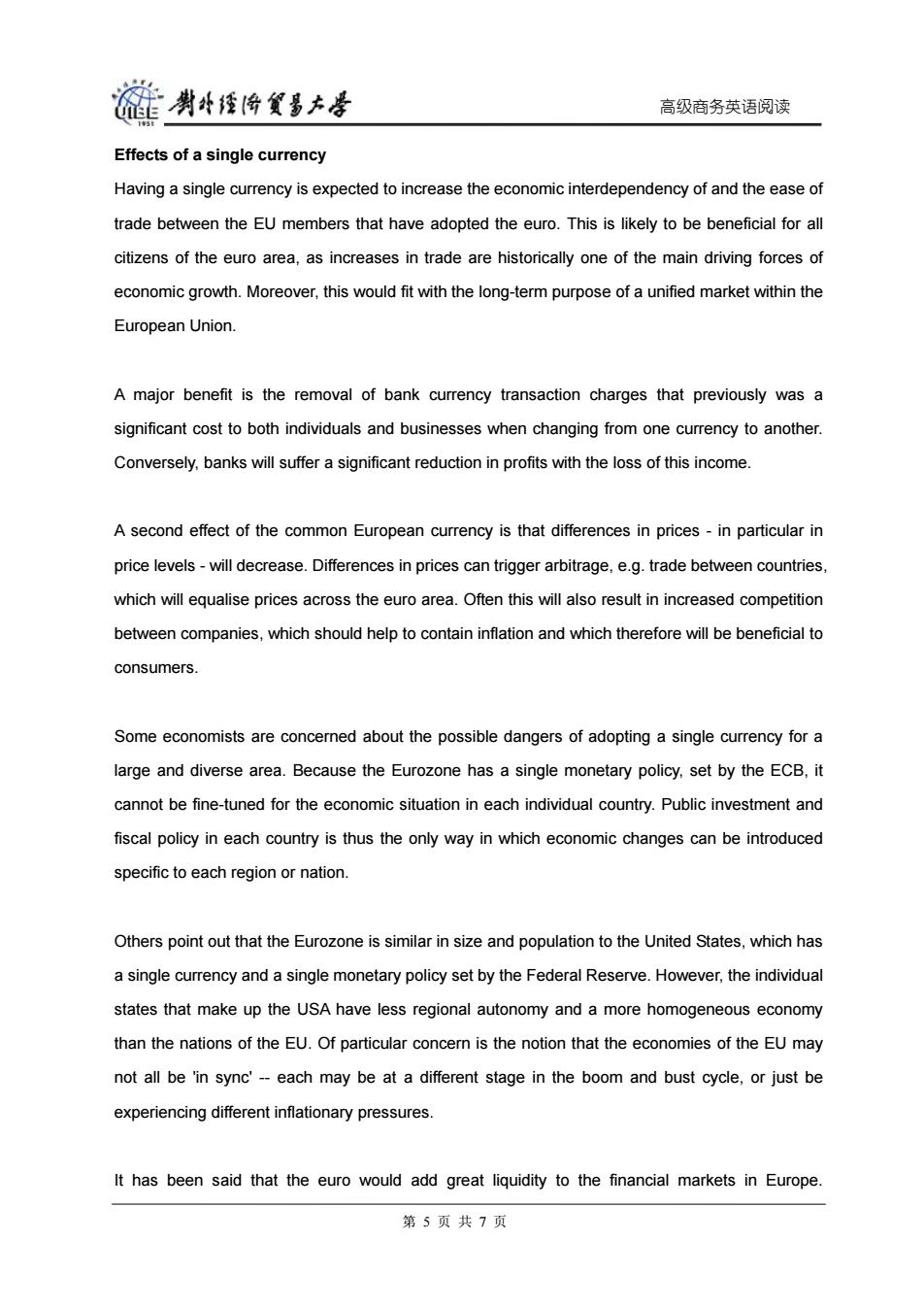正在加载图片...

链喇哈餐多方孝 高级商务英语阅读 Effects of a single currency Having a single currency is expected to increase the economic interdependency of and the ease of trade between the EU members that have adopted the euro.This is likely to be beneficial for all citizens of the euro area,as increases in trade are historically one of the main driving forces of economic growth.Moreover,this would fit with the long-term purpose of a unified market within the European Union. A major benefit is the removal of bank currency transaction charges that previously was a significant cost to both individuals and businesses when changing from one currency to another. Conversely,banks will suffer a significant reduction in profits with the loss of this income. A second effect of the common European currency is that differences in prices-in particular in price levels-will decrease.Differences in prices can trigger arbitrage,e.g.trade between countries, which will equalise prices across the euro area.Often this will also result in increased competition between companies,which should help to contain inflation and which therefore will be beneficial to consumers. Some economists are concerned about the possible dangers of adopting a single currency for a large and diverse area.Because the Eurozone has a single monetary policy,set by the ECB,it cannot be fine-tuned for the economic situation in each individual country.Public investment and fiscal policy in each country is thus the only way in which economic changes can be introduced specific to each region or nation. Others point out that the Eurozone is similar in size and population to the United States,which has a single currency and a single monetary policy set by the Federal Reserve.However,the individual states that make up the USA have less regional autonomy and a more homogeneous economy than the nations of the EU.Of particular concern is the notion that the economies of the EU may not all be 'in sync'--each may be at a different stage in the boom and bust cycle,or just be experiencing different inflationary pressures. It has been said that the euro would add great liquidity to the financial markets in Europe. 第5页共7页高级商务英语阅读 Effects of a single currency Having a single currency is expected to increase the economic interdependency of and the ease of trade between the EU members that have adopted the euro. This is likely to be beneficial for all citizens of the euro area, as increases in trade are historically one of the main driving forces of economic growth. Moreover, this would fit with the long-term purpose of a unified market within the European Union. A major benefit is the removal of bank currency transaction charges that previously was a significant cost to both individuals and businesses when changing from one currency to another. Conversely, banks will suffer a significant reduction in profits with the loss of this income. A second effect of the common European currency is that differences in prices - in particular in price levels - will decrease. Differences in prices can trigger arbitrage, e.g. trade between countries, which will equalise prices across the euro area. Often this will also result in increased competition between companies, which should help to contain inflation and which therefore will be beneficial to consumers. Some economists are concerned about the possible dangers of adopting a single currency for a large and diverse area. Because the Eurozone has a single monetary policy, set by the ECB, it cannot be fine-tuned for the economic situation in each individual country. Public investment and fiscal policy in each country is thus the only way in which economic changes can be introduced specific to each region or nation. Others point out that the Eurozone is similar in size and population to the United States, which has a single currency and a single monetary policy set by the Federal Reserve. However, the individual states that make up the USA have less regional autonomy and a more homogeneous economy than the nations of the EU. Of particular concern is the notion that the economies of the EU may not all be 'in sync' -- each may be at a different stage in the boom and bust cycle, or just be experiencing different inflationary pressures. It has been said that the euro would add great liquidity to the financial markets in Europe. 第 5 页 共 7 页